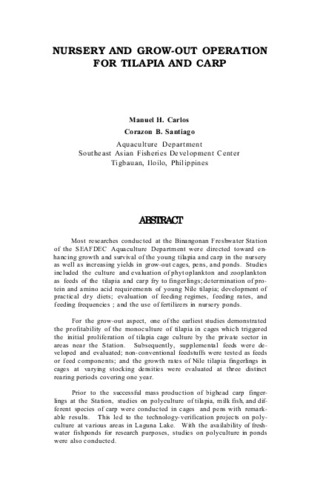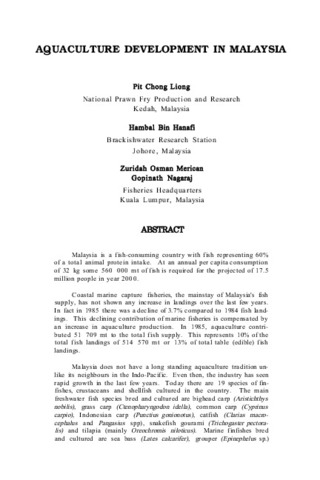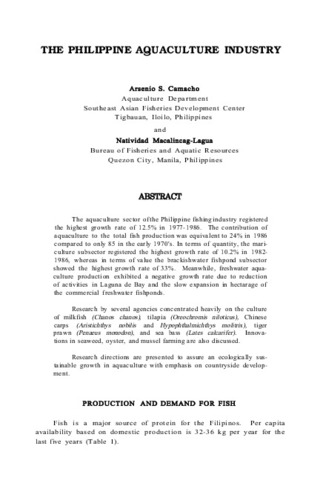Nursery and grow-out operation for tilapia and carp
- Global styles
- MLA
- Vancouver
- Elsevier - Harvard
- APA
- Help

Date
1988Page views
11,249ASFA keyword
stocking density 
cultured organisms
induced ovulation
freshwater fishes
fertilization
fish larvae
sex hormones
breeding stock
hatching
fish culture
aquaculture techniques
seed (aquaculture)
feeds
sex ratio
fry
husbandry diseases
pond culture
polyculture (aquaculture)
spawning
seed production
monoculture
rearing techniques
aquaculture facilities
water hardness
sexual maturity
cage culture
feeding experiments
freshwater aquaculture

cultured organisms

induced ovulation

freshwater fishes

fertilization

fish larvae

sex hormones

breeding stock

hatching

fish culture

aquaculture techniques

seed (aquaculture)

feeds

sex ratio

fry

husbandry diseases

pond culture

polyculture (aquaculture)

spawning

seed production

monoculture

rearing techniques

aquaculture facilities

water hardness

sexual maturity

cage culture

feeding experiments

freshwater aquaculture

AGROVOC keyword
Geographic names
Metadata
Show full item record
Share
Abstract
Most researches conducted at the Binangonan Freshwater Station of the SEAFDEC Aquaculture Department were directed toward enhancing growth and survival of the young tilapia and carp in the nursery as well as increasing yields in grow-out cages, pens, and ponds. Studies included the culture and evaluation of phytoplankton and zooplankton as feeds of the tilapia and carp fry to fingerlings; determination of protein and amino acid requirements of young Nile tilapia; development of practical dry diets; evaluation of feeding regimes, feeding rates, and feeding frequencies ; and the use of fertilizers in nursery ponds.
For the grow-out aspect, one of the earliest studies demonstrated the profitability of the monoculture of tilapia in cages which triggered the initial proliferation of tilapia cage culture by the private sector in areas near the Station. Subsequently, supplemental feeds were developed and evaluated; non-conventional feedstuffs were tested as feeds or feed components; and the growth rates of Nile tilapia fingerlings in cages at varying stocking densities were evaluated at three distinct rearing periods covering one year.
Prior to the successful mass production of bighead carp fingerlings at the Station, studies on polyculture of tilapia, milk fish, and different species of carp were conducted in cages and pens with remarkable results. This led to the technology-verification projects on polyculture at various areas in Laguna Lake. With the availability of freshwater fishponds for research purposes, studies on polyculture in ponds were also conducted.
Suggested Citation
Carlos, M. H., & Santiago, C. B. (1988). Nursery and grow-out operation for tilapia and carp. In J. V. Juario & L. V. Benitez (Eds.), Perspectives in Aquaculture Development in Southeast Asia and Japan: Contributions of the SEAFDEC Aquaculture Department. Proceedings of the Seminar on Aquaculture Development in Southeast Asia, 8-12 September 1987, Iloilo City, Philippines. (pp. 281-292). Tigbauan, Iloilo, Philippines: SEAFDEC, Aquaculture Department.
Type
Conference paperISBN
971851113XCollections
- ADSEA '87 [20]
Related items
Showing items related by title, author, creator and subject.
-
Aquaculture development in Thailand
Sirikul, Boonsong; Luanprida, Somsak; Chaiyakam, Kanit; Sriprasert, Revadee (Aquaculture Department, Southeast Asian Fisheries Development Center, 1988)Aquaculture practised in Thailand is in the form of pond culture and cage culture in freshwater, brackishwater and coastal areas. The main species cultured include freshwater prawns, brackishwater shrimp, cockles, mussels, ... -
Aquaculture development in Malaysia
Liong, Pit Chong.; Hanafi, Hambal Bin.; Merican, Zuridah Osman.; Nagaraj, Gopinath. (Aquaculture Department, Southeast Asian Fisheries Development Center, 1988)Malaysia is a fish-consuming country with fish representing 60% of a total animal protein intake. At an annual per capita consumption of 32 kg some 560 000 mt of fish is required for the projected of 17.5 million people ... -
The Philippine aquaculture industry
Camacho, Arsenio S.; Macalincag-Lagua, Natividad (Aquaculture Department, Southeast Asian Fisheries Development Center, 1988)The aquaculture sector of the Philippine fishing industry registered the highest growth rate of 12.5% in 1977-1986. The contribution of aquaculture to the total fish production was equivalent to 24% in 1986 compared to ...






